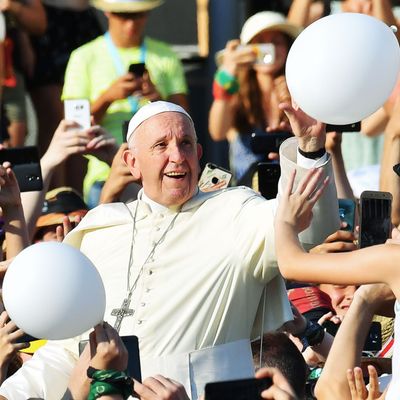
In what looks like an evolutionary step but one that will strike some traditionalist Catholics as a leap bordering on heresy, Pope Francis has ordered the official Church catechism (the compilation of teachings for the instruction of the faithful) to be reworded to change its past acceptance of capital punishment in certain circumstances to instead deem it “inadmissable” as “an attack on the inviolability and dignity of the person.” He also committed the Church to the worldwide abolition of the death penalty.
This change in teaching was signaled by Francis in 2015. It follows an earlier modification of the traditional teaching on the subject by Pope John Paul II, who limited capital punishment to “extreme cases” where “bloodless means” of administering justice are not available. The classic “full doctrinal defense” of capital punishment was provided in 1955 by Pope Pius XII, reflecting a general position that dated back to St. Thomas Aquinas and St. Augustine.
Most contemporary Catholic countries do not maintain the death penalty. It has vanished in Europe, with the exception of in Belarus. It’s also gradually disappeared — in practice, if not always officially — in Latin America; only Cuba, Guatemala, Guyana, and a smattering of small Caribbean states still maintain the right to put criminals to death. A big share of the countries that still use capital punishment are conservative Islamic or communist (or recently ex-communist) states.
Along with Japan, the United States continues to be a big exception to the general rule of highly developed and democratic countries abandoning capital punishment. Along with a lot of other cultural and moral issues, though, it has become politically polarized in this country. The 2016 Democratic national platform pledged the party to “abolish the death penalty, which has proven to be a cruel and unusual form of punishment.” The 2016 GOP platform went very much in the opposite direction:
The constitutionality of the death penalty is firmly settled by its explicit mention in the Fifth Amendment. With the murder rate soaring in our great cities, we condemn the Supreme Court’s erosion of the right of the people to enact capital punishment in their states.
Francis’ formulation of an anti–death penalty teaching is going to make life most uncomfortable for conservative Catholic state legislators, governors, and judges in the 31 states where executions still occur, as the New York Times notes:
Francis’ decision is likely to put many American Catholic politicians in a difficult position, especially Catholic governors, like Greg Abbott of Texas and Pete Ricketts of Nebraska, who have presided over executions …
It could also complicate the lives of judges who are practicing Catholics.
In a 2002 article, Justice Antonin Scalia, who died in 2016, said, “I do not find the death penalty immoral,” and added that he was confident that Catholic doctrine allowed for it to be used in some cases.
Not any more.
That will create some interesting questions for the three Roman Catholic conservatives now on the Supreme Court: John Roberts, Clarence Thomas, and Samuel Alito. The subject will likely come up in the confirmation hearings for Brett Kavanaugh, who is also Catholic. More generally, it will complicate life and rhetoric for Catholics who oppose legalized abortion on “pro-life” grounds but still support capital punishment. Pro-choice Catholics who oppose capital punishment will still have some big problems, but maybe fewer than before today.
So far President Trump hasn’t officially reacted to Francis’ announcement, and he probably shouldn’t. But this will add to the number of issues where the administration is at odds with the Vatican, as the Independent notes:
The pope made a global push for migrants’ rights during the height of the international refugee crisis, calling on nations to welcome those impacted by worldwide wars, famine and violence.
The pope supported the US Bishops Conference after it denounced Mr Trump’s “zero tolerance” policy along the US-Mexico border, describing the systematic separation of immigrant families as “immoral” and “contrary to our Catholic values.”
Francis is also pretty clear on warning about a climate-change crisis that Trump largely won’t admit to and certainly won’t do anything to address.
And the president clearly thinks more people need to be put to death:
Mr Trump has demanded the Justice Department seek the death penalty in some drug trafficking cases, saying during a speech in March that the government is “wasting our time” by not executing certain criminals with drug charges.
“If we don’t get tough on the drug dealers, we are wasting our time,” he said. “And that toughness includes the death penalty.”
Some religious conservatives will now intensify a posture that might be described as “more Catholic than the pope.” The vaguely Protestant president with his heathenish habits should probably just leave Francis alone.






























